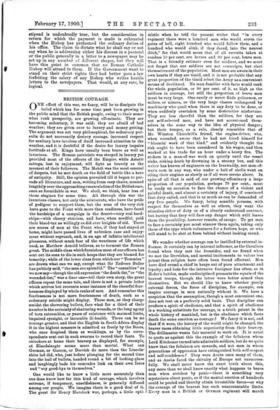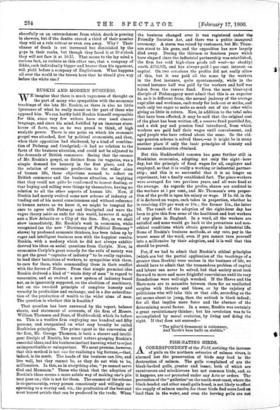BRITISH COURAGE.
ONE effect of this war, we fancy, will be to dissipate the belief which has for some time past been growing in the public mind that the British people, owing to their some- what rank prosperity, are growing effeminate. They are becoming sedentary, it was said; they are afraid of bad weather; they are given over to luxury and money getting. The argument was not very philosophical, for sedentary pur- suits do not necessarily destroy courage, increased respect for sanitary laws involves of itself increased attention to the weather, and it is doubtful if the desire for luxury impairs fortitude at all. Kings have usually been brave as well as luxurious. The Roman patriciate was steeped in luxury yet provided most of the officers of the Empire, while Asiatic satraps, lost in enjoyment, will fight as bravely as the meanest of their followers. The Mandi was the most sensual of despots, but he met death on the field of battle like a hero of antiquity. Still, the opinion prevailed till it began to per- vade all literature, and men, writing from easy chairs, moaned lengthily over the approaching emasculation of the British race, once so formidable in war. We shall, we think, hear less of those elegiacs for some time. All through this war the luxurious classes, not only the aristocrats, who have the pride of pedigree to support them, but the sons of the very rich have gone to the Front with more than readiness, have faced the hardships of a campaign in the desert—very real hard- ships—with cheery stoicism, and have, when needful, paid their blood-tax as willingly as did ever knights of old. There are scores of men at the Front who, if they had stayed at home, might have passed lives of unbroken ease and enjoy- ment without reproach, and, in an age of infinite intellectual pleasures, without much fear of the weariness of life which used, as Matthew Arnold believes, so to torment the Roman great. The middle class which furnishes most of our officers has sent out its sons to die in such heaps that they are blamed for temerity; while of the lower class from which our " Tommies " are drawn what can we say, except what Sir Redvers Buller has publicly said," the men are splendid." The " casualties " as we now say—though the old expression "the death-list," or "the wounded-list," was a finer one—tell their own story, the great officers repeat the same tale, and there is not a private letter which arrives but recounts some instance of the cheerful fear- lessness displayed by whole ranks of men. And remember this fearlessness is not mere fearlessness of death, such as a sedentary suicide might display. These men, as they charge amidst the showering bullets, face what for a third of their number is the certainty of shattering wounds, or the long agony of torn extremities, or years of existence with maimed limbs, impaired eyesight, or incurable ill-health. There can be no courage greater, and that the English in South Africa display it in the highest measure is admitted as freely by the Boers, who once despised them as weaklings, as by the corre- spondents sent out in such swarms to record their feats. To onlookers at home their bravery as displayed, for example, at Elandslaagte seems more than mortaL What can German, or Gascon, or Dervish do more than the Lincoln- shire lad did, who, just before plunging for the second time into the hail of bullets, handed round a bit of looking-glass and laughingly bade his comrades look on their own faces and " say good-bye to themselves.'
One would like to know a little more accurately than one does know how far this kind of courage, which involves extreme, if temporary, unselfishness, is generally diffused among our people. We imagine there is a good deal of it. The great Sir Henry Havelock was, perhaps, a little opti-
mistie when he told the present writer that "in every regiment there were a hundred men who would, storm the gates of hell, eight hundred who would follow them, and a hundred who would slink, if they dared, into the nearest ditch," for that would mean that of all recruits taken at random 10 per cent. are heroes and 90 per cent. brave men. That is a friendly estimate even for soldiers, and we must not forget that our soldiers are not conscripts, but elect themselves out of the population. Most men are aware in their own hearts if they are timid, and it is not probable that any great proportion of the timid select the Army as a convenient means of livelihood. No man familiar with facts would rank the whole population, or 90 per cent. of it, as high as the soldiers in courage, but still the proportion of brave men must be very large. One rarely or never finds policemen, or sailors, or miners, or the very large classes endangered by machinery who quail when there is any duty to be done, or when suddenly overtaken by some destructive misfortune. They are less cheerful than the soldiers, for they are not self-selected men, and have not accustomed them- selves in the same way to the idea of physical danger; but their temper, as a rule, closely resembles that of Mr. Winston Churchill's friend, the engine-driver, who, when wounded, swore that he had not hired himself for " bloomin' work of that kind," and evidently thought the risk ought to have been considered in his wages, and then worked at his trade for an hour under a heavy fire. The stokers in a man-of-war work on quietly until the vessel sinks, risking death by drowning in a steamy box, and this writer has known of engineers on the Irrawaddy, not men-of- war's men in any way, who under a hail of shells went on oiling their engines as slowly as if all were serene above. In spite of all that is said of our growing effeminacy a large proportion of our population, perhaps 70 per cent, must be ready on occasion to face the chance of a violent and painful death, and almost a certainty of injury, if convinced that duty called, and that is as much as can be demanded of any free people. We fancy, being sensible persons, with respect for themselves as well as others, they want the stimulus either of duty or of a clearly understood contract, but having that they will face any danger which still leaves them the possibility, however remote, of escape. To get men to face a certainty you must winnow them again, taking only those of the type which volunteers for a forlorn hope, or who will stand to be shot at from behind without looking round.
We wonder whether courage can be instilled by external in- fluence. It certainly can by internal influence, as the Cavaliers found when they met the Ironsides, and we found when we met the Dervishes, and mental incitements to valour less potent than religion have often been found effectual. Men have died round a chief in heaps out of pure attachment and loyalty; and hate for the intrusive foreigner has often, as in Hofer's battles, made undisciplined peasants the equals of the bravest troops, though the latter were better armed than themselves. But we should like to know whether purely external forces, the force of discipline, for example, can inspire courage in men naturally without it. We have a suspicion that the assumption, though a most convenient one, does not rest on a perfectly solid basis. That discipline can produce a spirit of obedience, and that a spirit of obedience is a working substitute for courage, is a truth patent in the whole history of mankind, but is the obedience which faces death the same emotion as courage ? We fancy it is not, and that if it were, the history of the world might be changed, the braver races obtaining little superiority from their bravery. The drillmaster wants fair material to work on. It is usual to quote as against this the example of the fellaheen whom Lord Kitchener turned into admirable soldiers, but do we quite know that the fellaheen are cowards, and not men in whom generations of oppression have extinguished both self-respect and self-confidence ? They were Arabs once many of them, and as Arabs faced the chivalry of Europe not unsuccess- fully. We shall never know the exact truth about this, any more than we shall know exactly what happens to brave men when stricken by panic—there is something very mysterious about panic, as if the mental emotion of hundreds could be pooled and thereby attain irresistible force—or why the courage of the bravest has such unaccountable limits. Every man in a British or German regiment will march cheerfully on an entrenchment from which death is pouring in showers, but if the deaths exceed a third of their number they will as a rule retreat or even run away. Why ? Their chance of death is not increased but diminished by the gaps in their ranks, but though they faced it at 10 o'clock they will not face it at 10.15. That seems to the lay mind a curious fact, as curious as this other one, that a company of Sikhs, each individually bigger and braver than his opponent, will yield before a company of Englishmen. What happens all over the world to the brown hero that he should give way before the white one ?







































 Previous page
Previous page